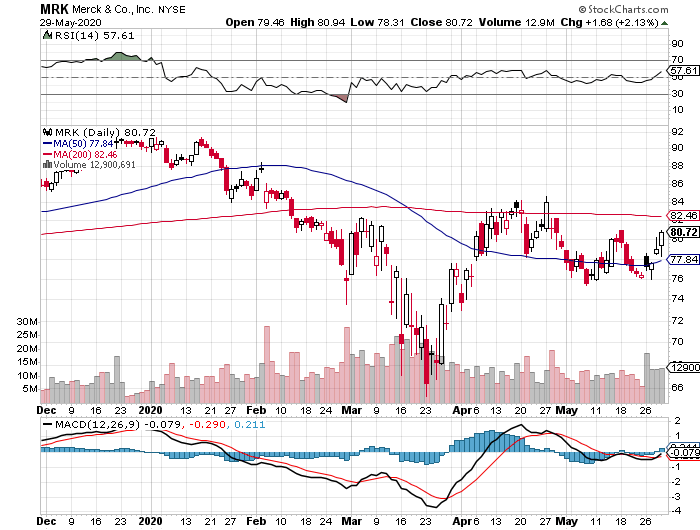Merck’s Big COVID-19 Expansion
Leading biotechnology and healthcare giant Merck (MRK), with a market capitalization of $203.75 billion, has been a low-key player during the pandemic.
Now, it finally reveals its grand plans via three major initiatives that aim to create a vaccine and design a novel antiviral against the coronavirus disease (COVID-19).
While Merck has been slow to take part in the COVID-19 war, it’s definitely making up for the lost time by announcing a promising acquisition and two collaborative projects in the works.
The first of the three deals is Merck’s acquisition of Vienna-based biotechnology company called Themis Bioscience. This small-cap biotech develops a range of vaccines and other therapies for infectious diseases.
One of Themis Bioscience’s pipeline candidates is a COVID-19 vaccine, which is a collaborative effort with the Institut Pasteur. Another promising candidate in Themis Bioscience’s pipeline is its late-stage work on a Chikungunya.
Through the acquisition, Merck will be able to access these works and hasten the development of the vaccine.
The second deal is Merck’s collaboration with a nonprofit scientific research group called International AIDS Vaccine Initiative (IAVI). This partnership aims to create a COVID-19 vaccine as well.
This will be a powerful collaboration since IAVI also received $38 million in funding from the US Health Department’s Biomedical Advanced Research and Development Authority (BARDA) to help them with their vaccine development initiatives.
Apart from IAVI, BARDA also awarded over $2 billion in funding to other vaccine developers like AstraZeneca (AZN), Phlow, and Moderna (MRNA).
Together, IAVI and Merck aim to optimize the latter’s recombinant vesicular stomatitis virus (rVSV) technology which has been used for Merck’s Ebola vaccine called Ervebo.
The third deal is Merck’s partnership with privately held Ridgeback Biotherapeutics, a Miami-based biotechnology company founded in 2018.
The collaboration intends to develop an oral antiviral treatment, dubbed as EIDD-2801, which can be used for COVID-19.
So far, this developmental drug had been proven safe in a trial with healthy volunteers. Clinical testing for COVID-19 patients has already commenced.
Under the terms of the deal, Merck will own exclusive global rights to EIDD-2801.
The giant biopharma will take charge of the clinical development, manufacturing, and regulatory procedures. In exchange, Ridgeback received an undisclosed amount in upfront payment and milestones. The smaller biotechnology company will also be entitled to a share of net proceeds from the COVID-19 treatment.
Prior to these deals, investors have been curious as to why Merck was missing in action amid the government’s “Operation Warp Speed” for COVID-19 treatments and vaccines.
With this triple play, Merck has signaled that it’s also going all-in on this pandemic and will pull out all the stops to be on the same level as the efforts from other major biotechnology and healthcare players like GlaxoSmithKline (GSK), Pfizer (PFE), and AstraZeneca (AZN).
The strategic moves from this healthcare giant clearly underscore the incredible demand for any vaccine that actually survives the R&D gamut, as every nation across the globe frantically looks for a vaccine to boost their people’s immunity.
While companies such as CanSino (HKG:6185) and Moderna go neck to neck to take the lead in the clinical race, we all know that two companies cannot handle the production of a vaccine for the entire world -- offering Merck a slot at a place in these chosen group of companies.
Outside its COVID-19 efforts, Merck recently chalked up another win for its blockbuster melanoma drug Keytruda. This time, the top-selling medication expanded its use to advanced colon cancers.
Based on key findings, Keytruda lowered the risk of the disease’s progression or even death by 40% compared to chemotherapy.
Results show that the tumors of patients given Keytruda did not grow for 16.5 months. In comparison, chemotherapy patients experienced tumor growth in 8.2 months.
Even prior to the expansion of its indications, Keytruda sales have continued to make headway.
In the first quarter of 2020, sales of this cancer drug reached $3.3 billion, showing off a whopping 45% year-over-year jump.
With this new addition to Keytruda’s indications, sales of this drug is expected to climb even higher this year.
Apart from that, Merck’s HPV vaccines, called Gardasil and Gardasil 9, performed well in the first quarter as well as sales of both HPV vaccines increased by 31% to reach $1.1 billion.
Another strategic effort for Merck is delving into drug development focused on neurodegenerative diseases like Alzheimer’s, Parkinson’s, and Huntington’s disease.
This initiative was kicked off by Merck’s move to buy a GSK startup, called Calporta Therapeutics, for $576 million in 2019.
It was followed by forging a two-year partnership with Almac Discovery this year. Apart from neuro-related diseases, the two companies are looking into developing therapies for cancer and viral diseases as well.
To further boost its pipeline, Merck completed a deal with Taiho Pharmaceuticals and Astex Pharmaceuticals worth $50 million in upfront payment plus incentive payments of up to $2.5 billion.
The company is also working on spinning off its "Women's Health, Trusted Legacy Brands, and Biosimilars” products into a brand new company with a focus on oncology and vaccines as well as animal health. If things go smoothly, the spinoff should be done by the first half of 2021.
Overall, Merck has proven itself as a stable dividend stock that investors can simply buy and hold for years.
The biotechnology company has managed to post a profit every year for the past decade, actually hitting double-digits most of the time within that period.
This is a trend observed in Merck’s first quarter report as well. The company posted $3.2 billion in profit on sales worth $12.1 billion. This represents a respectable 27% profit margin.


